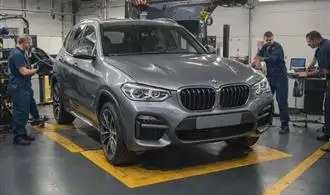
Mistake 1 Ignoring Engine Upgrades
When it comes to upgrading the performance of your BMW X3, overlooking engine upgrades can be a costly mistake. The engine is the heart of your vehicle, and upgrading it can unlock a whole new level of power and responsiveness. From installing a high-flow air intake to upgrading the turbocharger, there are numerous ways to breathe new life into your X3's engine. However, it's crucial to approach these upgrades with caution and ensure they are compatible with your vehicle's specific model and components. Improperly installed or incompatible upgrades can lead to issues such as decreased fuel efficiency, increased emissions, and even potential engine damage. To avoid these pitfalls, it's recommended to work with a reputable and experienced BMW specialist who can guide you through the process and ensure your engine upgrades are done right. Taking the time to research and invest in the right engine upgrades can transform the driving experience of your BMW X3, making it a true joy to command on the road.
Mistake 2 Overlooking Suspension Modifications
The suspension system is a critical component in the BMW X3's overall performance and handling. Upgrading the suspension can transform the driving dynamics of your X3, unlocking its full potential on the road or track. One common mistake made by enthusiasts is overlooking the importance of suspension modifications. Improving the suspension can enhance responsiveness, grip, and stability, allowing you to push your X3 to its limits with confidence.
When considering suspension upgrades, it's essential to focus on components like shocks, springs, and bushings. High-quality aftermarket shocks can provide better damping control, improving the X3's ability to absorb bumps and maintain composure through corners. Upgrading the springs can lower the vehicle's center of gravity, reducing body roll and improving overall handling balance. Additionally, replacing worn or stock bushings with performance-oriented alternatives can enhance steering feel and precision, further refining the X3's driving characteristics.
Mistake 3 Neglecting Brake System Upgrades
When it comes to enhancing the performance of your BMW X3, the brake system is a critical component that often gets overlooked. Upgrading your brakes is essential to ensure your vehicle can safely and effectively handle the increased power and speed that come with other performance enhancements. Neglecting this crucial aspect can not only compromise your safety but also lead to premature wear and tear on your brakes, resulting in costly repairs down the line.
One of the primary reasons to upgrade your BMW X3's brake system is to improve its stopping power. As you increase the engine's output and the vehicle's top speed, the brakes must be able to provide the necessary braking force to bring the car to a controlled stop. Stock brakes may struggle to cope with the added demands, leading to longer braking distances and increased risk of accidents.
- Brake Pads: Opt for high-performance brake pads that are designed to withstand the high temperatures and friction generated during aggressive driving. These pads offer improved braking performance, better fade resistance, and longer lifespan compared to standard pads.
- Brake Rotors: Upgrading to larger, more robust brake rotors can significantly enhance your BMW X3's braking capabilities. Larger rotors provide more surface area for the pads to grip, resulting in greater stopping power and better heat dissipation.
- Brake Calipers: Replacing the stock calipers with larger, more powerful ones can further improve braking performance. Upgraded calipers often feature multiple pistons, allowing for more even and consistent brake force distribution across the pads.
- Brake Fluid: Ensure that you use a high-quality, high-temperature brake fluid that can withstand the increased heat generated by your upgraded brakes. This will help prevent brake fade and maintain consistent pedal feel under demanding conditions.
- Brake Lines: Consider upgrading to stainless steel braided brake lines, which are less susceptible to expansion under high pressure and temperature, providing a more responsive and reliable braking system.
Mistake 4 Ignoring Aerodynamic Enhancements
One of the most common and often overlooked aspects of upgrading the performance of a BMW X3 is the importance of aerodynamic enhancements. The X3's aerodynamic design plays a crucial role in its overall performance, fuel efficiency, and handling characteristics. Neglecting to address the aerodynamics can limit the effectiveness of other performance upgrades, ultimately resulting in a suboptimal driving experience.
- Increased top speed and acceleration: Improving the aerodynamic efficiency of your X3 can reduce drag, allowing the engine to propel the vehicle to higher speeds with less effort. This translates to enhanced acceleration and a higher top speed.
- Enhanced fuel economy: By reducing drag, aerodynamic upgrades can improve the X3's fuel efficiency, resulting in lower fuel consumption and extended driving range.
- Improved stability and handling: Aerodynamic modifications can help the X3 maintain better stability and control at higher speeds, enhancing the overall driving dynamics and responsiveness.
- Front Splitter: A well-designed front splitter can help redirect airflow under the vehicle, reducing lift and improving downforce. This can enhance high-speed stability and cornering grip.
- Rear Spoiler or Wing: Adding a rear spoiler or wing can help reduce drag and create additional downforce, further improving high-speed stability and cornering performance.
- Underbody Diffuser: An underbody diffuser can help manage the airflow beneath the vehicle, reducing turbulence and improving overall aerodynamic efficiency.
- Side Skirts: Properly fitted side skirts can help smooth the airflow along the sides of the X3, reducing drag and enhancing stability.
- Wheel Well Modifications: Addressing the airflow around the wheel wells, such as installing aero-optimized wheel well liners, can contribute to the overall aerodynamic efficiency of the vehicle.
It's important to note that when it comes to aerodynamic upgrades, it's crucial to choose high-quality, performance-oriented components that are specifically designed for the BMW X3. Inferior or ill-fitting parts can negatively impact the vehicle's aerodynamics and, in some cases, even compromise safety and stability.
Mistake 5 Underestimating the Importance of Tires
When it comes to upgrading the performance of your BMW X3, one area that's often overlooked is the importance of tires. Many enthusiasts focus on engine modifications, suspension upgrades, and aerodynamic enhancements, but fail to recognize the crucial role that tires play in maximizing the vehicle's potential. Tires are the only point of contact between your X3 and the road, and they have a significant impact on handling, grip, and overall driving dynamics.
Choosing the right tires for your BMW X3 can make a dramatic difference in the way the vehicle performs. High-performance summer tires, for instance, offer superior grip and responsiveness, allowing you to push the limits of the X3's capabilities on twisty roads or at the racetrack. All-season tires, on the other hand, provide a more balanced compromise between dry and wet weather performance, making them a practical choice for daily driving.
When upgrading the tires on your BMW X3, it's crucial to consider factors such as tire size, width, and compound. Wider tires, for example, can improve lateral stability and cornering grip, but they may also increase rolling resistance and reduce fuel efficiency. Similarly, the tire compound can have a significant impact on performance, with softer, stickier compounds offering more grip but potentially wearing out faster.
Beyond just selecting the right tires, it's also important to ensure proper tire maintenance. Regular tire rotations, proper inflation pressure, and timely replacements can all contribute to the longevity and performance of your tires. Neglecting these aspects can lead to premature wear, reduced grip, and even safety concerns.
Mistake 6 Ignoring Drivetrain Modifications
When upgrading the performance of your BMW X3, one of the most crucial areas to focus on is the drivetrain. Many enthusiasts make the mistake of overlooking the impact of drivetrain modifications, which can have a significant effect on the overall driving experience. Ignoring this aspect can lead to suboptimal performance, decreased efficiency, and even potential reliability issues down the line.
The BMW X3's drivetrain is a complex system that includes the transmission, differential, and all-wheel-drive (AWD) components. Upgrading these components can unlock a whole new level of performance and capability. For instance, installing a high-performance clutch or upgrading the transmission fluid can improve power transfer and responsiveness. Similarly, optimizing the differential settings or installing a limited-slip differential can enhance traction and cornering ability, particularly in spirited driving scenarios.
When it comes to AWD-equipped BMW X3 models, the importance of drivetrain modifications is even more pronounced. The AWD system plays a crucial role in delivering power to the wheels and maintaining control in various driving conditions. Upgrading the AWD components, such as the transfer case, driveshafts, or differential, can significantly improve the X3's ability to put power down effectively and enhance its performance in both straight-line acceleration and cornering.
Furthermore, it's important to ensure that any drivetrain modifications are compatible with the overall system and are installed by experienced professionals. Improper modifications or poor workmanship can lead to driveline binding, premature wear, or even catastrophic failures that can be costly to repair.
Mistake 7 Overlooking the Importance of ECU Tuning
When it comes to upgrading the performance of a BMW X3, one of the most crucial aspects that is often overlooked is ECU tuning. The ECU, or Engine Control Unit, is the brain of the vehicle, responsible for managing various engine functions, from fuel injection to ignition timing. By optimizing the ECU's programming, you can unlock the full potential of your BMW X3's powertrain, leading to significant performance gains.
ECU tuning is not just about increasing power output. It also allows for more precise control over the engine's operation, enhancing responsiveness, throttle feel, and fuel efficiency. A well-tuned ECU can transform the driving experience, making your BMW X3 feel more engaging and connected to the road.
However, ECU tuning is not a one-size-fits-all solution. It requires a deep understanding of your BMW X3's specific engine and drivetrain characteristics, as well as the ability to expertly calibrate the ECU's parameters. Attempting to tune the ECU without the proper knowledge and tools can lead to disastrous consequences, such as engine damage or unexpected performance issues.
To ensure you get the most out of your ECU tuning experience, it is crucial to work with a reputable and experienced tuning specialist. They will have the necessary expertise to analyze your BMW X3's unique requirements, develop a custom tune, and ensure that the changes are seamlessly integrated without compromising the vehicle's reliability or safety.
When selecting an ECU tuning provider, look for one that uses advanced diagnostic tools, has a proven track record of successful BMW tuning projects, and provides a comprehensive warranty on their work. This will give you the confidence that your BMW X3's performance upgrade is being handled by true professionals.


















